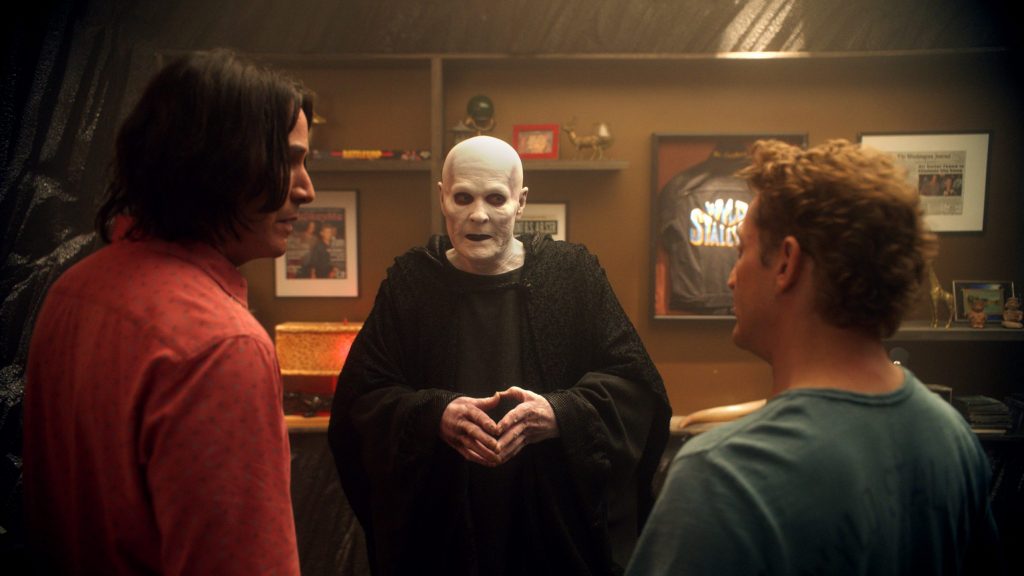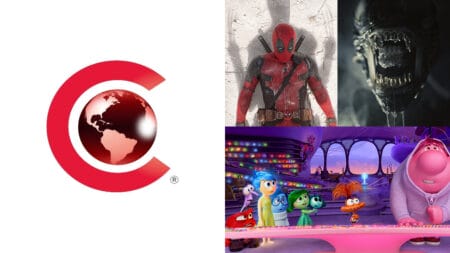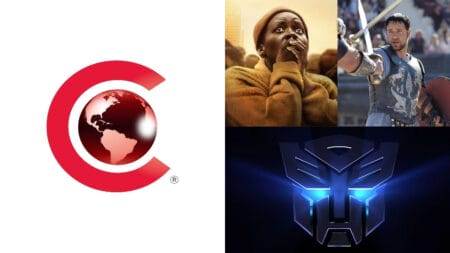Hey! Welcome to DiscussingFilm’s review of Bill & Ted Face the Music. It will be a most comprehensive reflection on the movie, the third in an atypical series from the past. There is much to expect from a cinematic endeavor of epic proportions starring iconic characters that possess an eternal appreciation of music. It is totally righteous, though. Check it out!
Bill & Ted is a most peculiar franchise. The first film, Bill & Ted’s Excellent Adventure released in 1989, is a simple tale. It tells the story of two airheaded best friends, Bill S. Preston, Esq. (played by Alex Winter) and Ted ‘’Theodore’’ Logan (played by Keanu Reeves), who are in an inept band together named the Wyld Stallyns. When they risk failing their history class, Ted’s father threatens to send him to military school so he can become disciplined and responsible. The 27th century intervenes to prevent this possible tragedy, citing that the Wyld Stallyns must remain intact because their music will become the foundation of the future’s utopian society. The boys are gifted a time machine for the night, allowing them to travel to the past and snatch the historical figures they need for their final history report.
The sequel, Bill & Ted’s Bogus Journey released 2 years later, has a more complicated plot involving the death of its protagonists, evil doppelganger robots, their befriending of Death, better known as the Grimm Reaper, and a mission through heaven and hell in an attempt to return to the land of the living. Both films were met with mixed reception (the latter more than the former) and while they inspired spin-offs in a variety of mediums, Bill & Ted is fondly remembered as more of a cult classic property than a franchise.

But what is the magic formula of Bill & Ted? Their films are absurdist in both concept and execution, but that is part of the endearment. Much of the secret sauce is derived from Winter and Reeves’ performances and chemistry, nailing the difficult to pin attitudes of Bill and Ted. The pair is so far removed from reality, living in a world of their own simplistic logical reasoning and distinct dialect. While the series itself could fall into the category of the run of the mill “dumb buddy comedy”, it transcends that label. The films don’t seek to just make fun of the protagonists and laugh at their incompetence because within their world, they are competent. Even their vernacular, which appears to be dumbed down, actually contains a wide vocabulary, reflecting their simultaneous idiocy and genius. Things go wrong, chaos ensues, but the same backward thinking that placed them in those situations also frees them from it. Entering the films, suspend disbelief at the door and go with the flow for maximum enjoyment. Bill and Ted’s world is an experience, a one of a kind feat, and it’s difficult to judge it like any other film.
The concept of a late-term cinematic addition is worrying given the unique quality of Bill & Ted. While the original two films were small scale creations of a different era in the low to mid-budget range, the franchise culture of the 21st century is largely obsessed with spectacle. Bigger action, more special effects, a grander adventure. This is not inherently a bad thing, yet many franchises lose their footings on what made them so likable in the first place by trying to play with flashier possibilities or trying to appeal to a more disenchanted audience. The long-awaited threequel, Bill & Ted Face the Music, does not fall into this trap. It is not a gaudy appeal to nostalgia, but a heartfelt extension of the previous works.
Bill & Ted Face the Music is penned by Chris Matheson and Ed Solomon, the original creators of the series, and directed by Dean Parisot, known for Galaxy Quest. It takes place roughly a quarter of a decade after the events of Bill & Ted’s Bogus Journey, which apparently ended on a deceptively high note. Despite the Wyld Stallyns’ chronicled success, they still have failed to write the song that unites the world. Ted’s father is still disappointed in his son. Their marriages to the princesses they picked up from the 15th century are increasingly strained by the pair’s codependency. For the first time, the princesses have a chance to truly exercise agency over their situation by examining why they stay with their husbands. They have daughters who share their father’s vernacular, attitude, and love of music. The girls are supportive and wide-eyed with appreciation as they enthusiastically carve a path for themselves. The mix of old and new creates a story that does not needlessly rehash conflicts from the previous films, but acts as a natural progression.
Bill and Ted have always been their own worst enemies and Face the Music meaningfully expands on that. Their own world, practically void of judgement, has been burdened by immense pressure, crippling their ability to succeed. Caught in this mission, they have let their personal lives fall victim to neglect. This subject matter is heavier than the previous films which have centralized themes revolving around the lack of self accountability preventing them from progressing musically. In Face the Music, Bill and Ted have musical skill, and now must go on a journey of self discovery in the most literal sense of the word, confronting their future selves to acquire the song they haven’t been able to write yet. The same accountability they learned now weighs so heavily on them that they suffocate under the pressure. The solution to their problem feels so familiar because it’s a longer version of the iconic bit from previous films, hatching a plot with their future selves to pluck what they need out of time and almost magically resolve the issues of the present.

Winter and Reeves are able to re-embody their previous roles with a startling accuracy, seemingly unhindered by decades apart from the characters. William Sadler continues to delight as Death. Samara Weaving and Brigette Lundy-Paine as Theodora “Thea” Preston and Wilhelmina “Billie” Logan settle into their respective characters by emulating the Bill and Ted vibe while still making it their own as fresh and familiar additions. Their adventure through time is just as whimsical and fun as their fathers’ but is slightly more grounded and appreciates the impact of a wider range of cultures and periods. The new characters such as Kristen Schaal’s Kelly or Anthony Carrigan’s robot have the right amount of screentime and their comedy is appreciated. The one and only Kid Cudi does have an apt place in this movie and his bit sticks. The absurdity is raised a few degrees, amplified by a larger spectacle than the first two with higher stakes, yet Face the Music still feels true to the heart of original and is a good modernization of how the series has always felt.
If you like the previous Bill & Ted films, you will embrace Face the Music with open arms. It is a satisfying conclusion, a resolution you didn’t know you needed until you’ve experienced it. If you don’t like the previous Bill & Ted films, it’s time to give it another shot. Experience the film through the eyes of Bill and Ted: suspend your disbelief, disconcern yourself with the technicalities and accuracies of the world, and strap in for a good time. Bill & Ted Face the Music is a most triumphant finale, with an ending that is not a hope for future, but more of a resplendent celebration of all that has come before and a stellar cherishing of the present.
★★★★★




